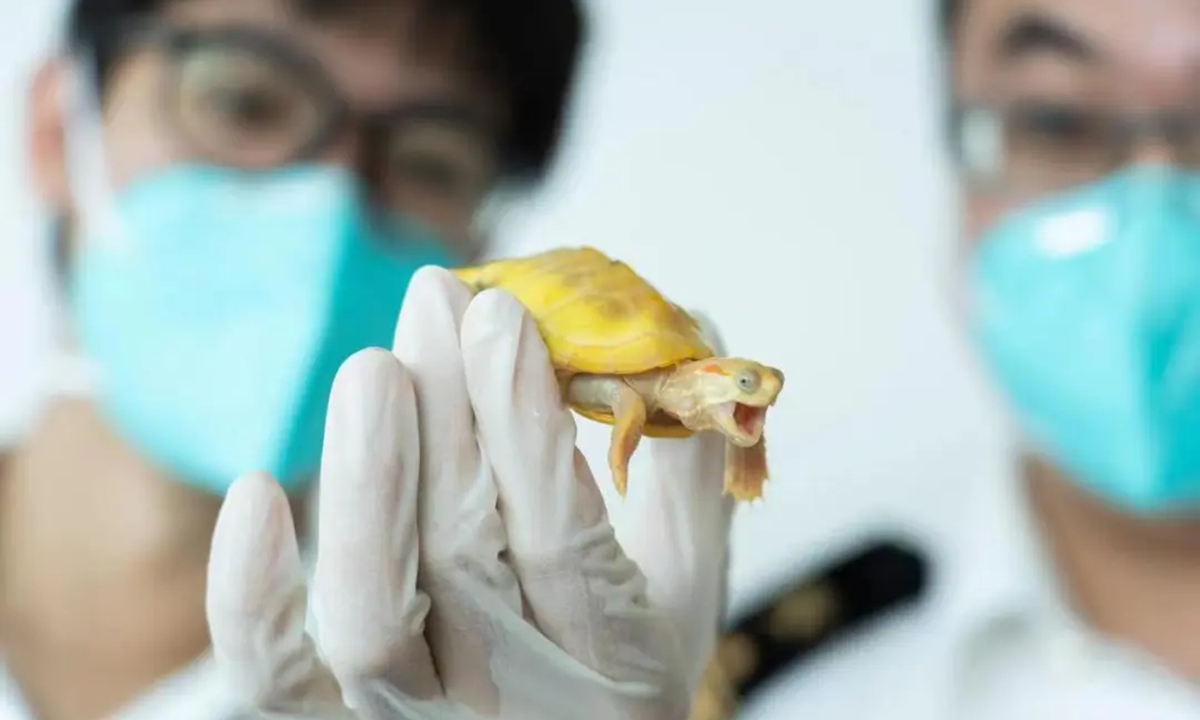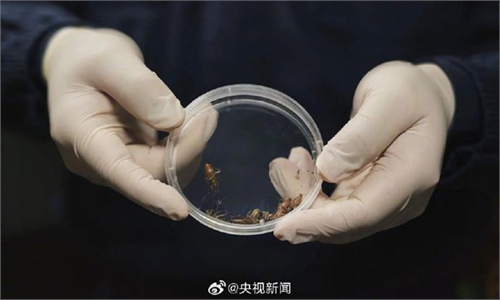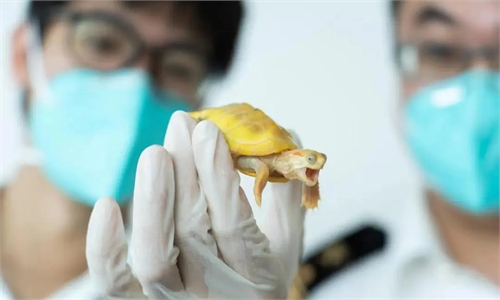China raises public awareness about preventing invasive species
'Safeguarding biosecurity should be a comprehensive system'

The Brazilian red-eared turtle is listed as one of the 100 most invasive species by the International Union for Conservation of Nature. Photo: Official WeChat account of China's General Administration of Customs
China is emphasizing biosecurity as a crucial component of its national security system during the celebration of National Security Education Day that fell on Monday. Customs in numerous cities have launched a series of events to raise public awareness about preventing the spread of invasive species.
Customs in Lanzhou, Northwest China's Gansu Province, has carried out an event on Monday to guide the public to enhance their awareness of preventing invasive alien species through interactive sessions, according to local media reports. Customs is also popularizing knowledge of prohibited animals, plants, and their products through videos, brochures and posters.
According to reports, Beijing Customs has intercepted a total of 933 batches of prohibited imported animals, plants and their products in the first quarter of 2024, of which 198 were considered exotic species, and all of which have been strictly disposed of in a safe manner in accordance with the law. Customs offices in Changsha, Central China's Hunan Province, have seized 106 kinds of foreign pests from trade channels, 74 kinds of foreign species from travel and postal inspection and other channels in the first quarter of 2024.
Changsha Customs also found three batches of unapproved special items, 10 batches of imported vectorial organisms, and 11 kinds of live ants, totaling 151 pieces, seized from incoming mail on four consecutive occasions.
Those activities are in line with a one-year campaign to "punish the crime of illegally introducing invasive alien species" launched by the General Administration of Customs, together with the Supreme People's Court and the Supreme People's Procuratorate, starting from September 2023.
Notably, China's General Administration of Customs on Saturday released the first public prosecution case regarding illegal introduction of an invasive alien species. It noted that the procuratorate in Zhuhai, South China's Guangdong Province has filed an indictment against a man on suspicion of illegally bringing 2,015 Brazilian red-eared turtles into China.
Biological invasion is one of the major ecological problems facing the world. More than 660 invasive alien species have been recorded to have entered China, one of the severest levels globally, according to China Central Television.
The lack of awareness among the general public, academics and the government concerning invasive species has undermined evaluation of the national security risks they bring, Wei Sheng, a professor at the School of Public Health and Emergency Management from Southern University of Science and Technology, told the Global Times on Tuesday.
In recent years, some pet lovers in pursuit of the so-called novelty and curiosity have imported "exotic pets" from abroad through illegal means and channels. Invasive alien species that have been seized by Customs authorities include but not limited to lizards, spiders, snakes, and ants.
Customs in Nanjing, East China's Jiangsu Province, reminded the public that the popular exotic pets in the market may be highly toxic or carry potential virus, causing unpredictable damage to our ecological environment.
From the whole legislative system, China lacks the legislative idea of preventing biological invasion in the field of ecological law, and should strengthen the scientific thinking of preventing the invasion of wild life in a comprehensive way, Cao Mingde, a professor of Environmental Law at the China University of Political Science and Law, told Legal Daily.
On Tuesday, a 14-minute video released by the National Health Commission introducing biosecurity highlighted the close link between a potential pandemic, biosecurity and the prevention of alien species. It said that when biosecurity risks caused by alien species prevail, it will have an impact on one country's public health, economic operation as well as social order and national security.
Xu Jianchu from the Kunming Institute of Botany at the Chinese Academy of Sciences told the Global Times that we should highlight that safeguarding biosecurity is a comprehensive system, which involves academic studies, systematic surveillance and public awareness.
In light of COVID-19 pandemic, World Health Organization also established the "X" pathogen to draw the attention of countries around the world to the unknown, great harm and high probability of the potential outbreak of infectious diseases, Wei told the Global Times.
Agreeing with Xu in response to a future pandemic, Wei said that the prevention and control of invasive alien species is by no means a department or a local matter, and it is necessary to promote departmental cooperation and inter-provincial linkage from the height of national security so as to ensure the long-term prevention and control work.



